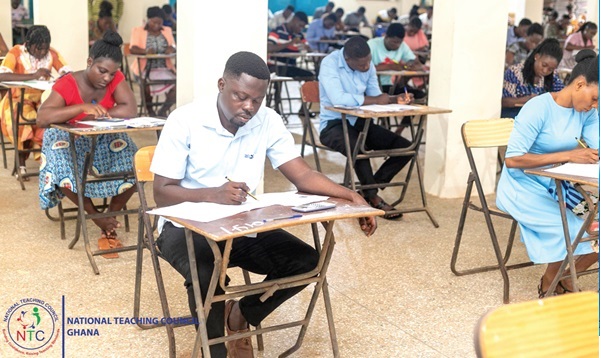
Politicians must consolidate teacher licensing
As the country heads into hectic political campaigning which will lead to the 2024 general election, the temptation to politicise everything is high as it has always been in every election year.
One such area is education which promises to be a focus of the political parties in their attempt to win power. It is important that political parties desist from politicising issues surrounding teacher licensing and professionalism. Before coming out with a manifesto on education every political party’s focus should be on how to consolidate the gains made regarding the reforms in our teacher education system.
Education in general, and teacher education in particular in the country, has come far and politicians should not wind the clock back.
The Daily Graphic believes that the significant gains made in teacher professionalism are yielding fruits, with Ghanaian teachers acquitting themselves very well globally. For instance, between 2018 and 2023 four Ghanaian teachers have featured in the list of the top teachers in the Global Teacher Prize, the last two reaching the top 10.
We believe that this is an indication that something is being done right in teacher education, and that should be maintained. Reports that Ghanaian teachers are sought after in other
African countries, Europe, the Americas and Asia should be something worth celebrating.
Additionally, information that Ghanaian teachers are exempted from any assessment for Qualified Teachers Status in the United Kingdom has confirmed the quality of teachers produced by our teaching institutions.
It is good that the licensing of teachers is explicit in the Education Act of 2008, Act 778. The Act empowers the National Teaching Council (NTC) to conduct the professional examination for individuals who want to take teaching as a profession.
Since 2018 when the first-ever teacher licensure examination took place with the colleges of education serving as examination centres throughout the country, acquiring a professional licence has become mandatory. Ever since, the teaching licence has become a requirement for all professionally qualified teachers in Ghana and ensures that the holder meets the standards and requirements to teach. So, teacher trainees graduating from the colleges of education or the universities are required to pass the licensure examination before seeking to serve as teachers with the GES.
The good thing about the examination is that those who are already teaching are not required to write the examination but they are undertaking a number of in-service professional training programmes to upgrade themselves to enable them to get the licence.
The Daily Graphic is happy that the NTC did not make it mandatory for teachers already in the classroom to write the examination because it would have been a big disservice for someone who had taught for years to be told to go back and write an examination to be made a professional.
We believe that making teaching a recognised profession comes with a number of advantages for not only the Ghanaian teacher but the country as a whole because it would ensure that we have quality teachers to teach our children and raise the standard of teaching in Ghana.
Apart from the standardisation, licensing Ghanaian teachers will also prepare them to be accepted globally.
It is, therefore, in the light of the advantages of getting our teachers to be professional to rub shoulders with their counterparts in any part of the world that we join in the clarion call to strengthen teacher licensing.
At the 70th anniversary of the Kpando SHS recently, the Executive Chairman of the First Sky Group, Eric Kutortse, also supported the need for politicians to desist from politicising education and called for a national policy on education no matter the political party in power.
It is becoming clear that as Ghanaians, certain aspects of our development must be devoid of politics, and education is one of such. We, as a country, must be deliberate about that and together we can build a robust and resilient nation.
Politicising education amounts to toying with the future of our young ones and setting a dangerous path for the country.
